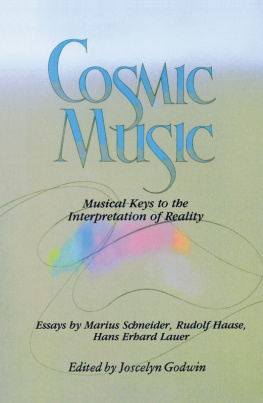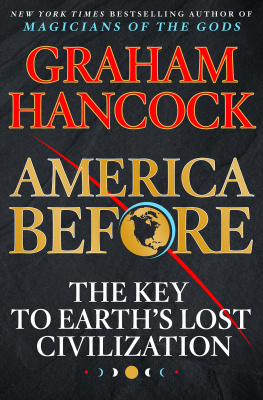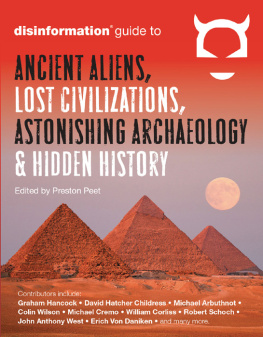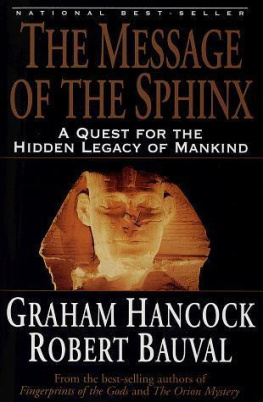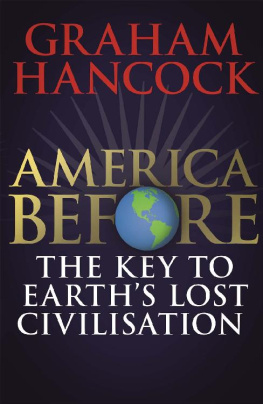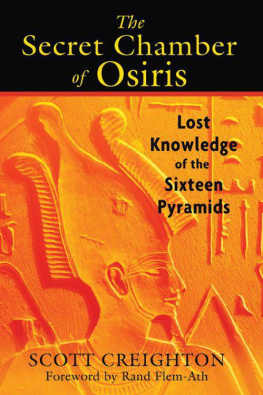I would like to dedicate this book to all my wonderful family,
including my mom and dad, who always encouraged reading, education, and open- minded exploration;
my wife, Stephanie, without whose help and support this project would not have happened;
and my two great kids, Sophie and Jason, for inspiring and keeping alive my inner child.
Contents
Omar Rosales
Joseph Selbie and David Steinmetz
David Frawley
Dr. Manjir Samanta-Laughton
Lucy Wyatt
Joscelyn Godwin
Gregory Sams
Christopher Knight and Alan Butler
Harry Sivertsen and Stephen Redman
Jonathan Talat Phillips
Flavio Barbiero
Gary A. David
Glenn M. Kreisberg
Antoine Gigal
Anthony Peake
Daniel Pinchbeck
Geoff Stray
Acknowledgments
In compiling this anthology of articles, I had the privilege of working and interacting with a group of writers and researchers from across our ever-shrinking globe who have inspired and challenged our minds to consider reasonable alternatives for the path of human knowledge, technology, civilization, and consciousness. For delving deep into the recesses of our ancient past and helping pull back the veil that separates worlds, giving us a glimpse of our true existence and spiritual reality, I wish to offer my profoundest thanks and recognition to all the authors whose work appears in these pages. Their work offers new pieces for a puzzle whose picture is, more and more, turning out to be far from complete.
Additionally I wish to thank all the kind folks at Inner Traditions Bear & Co. for their support, encouragement, and patience during the course of this project. And lastly I would like to acknowledge author and researcher Graham Hancock, whose approach, insights, and body of work continue to lay the foundation on which so many of us try to build in the pursuits of our particular passions. Without Graham, all these articles, which he commissioned for online discussion, would not exist.
Introduction
GLENN KREISBERG
In bringing together this collection of articles, building on and complementing the previous volume, Lost Knowledge of the Ancients , I looked beyond the sensational, beyond the 2012 prophecies and neoNew Age phenomenon that has peaked since the millennium. Instead, we have not a wild journey of unbridled speculation but one of careful study, analysis, and contemplation of evidence, using common sense sometimes combined with uncommon intuition. The researchers presented come from many different walks of life, a wide range of backgrounds, and various regions of the globe, yet all share a common drive and life passion in their fields of endeavor.
According to G. I. Gurdjieff, one of the worlds great spiritual teachers, there was, or is, a secret school or brotherhood (or monastery) that existed in Afghanistan for thousands of years called the Sarmoun Darq. The name of the school translates roughly to beehive or collectors of honey. Gurdjieff is said to have searched the world for many years to find the source of esoteric teaching and to have finally found what he was looking for in the Sarmoun Darq. The school existed to gather up and preserve certain kinds of ancient knowledge regarding the human soul, and it is said many other such schools once existed with a similar purpose. In times when such knowledge was known to be dissipating, these schools served a most important purpose, for without the preservation of this knowledge and its continued reintegration into the human spirit, we would cease to evolve.
Stored, sacred knowledge exists around the world today, and those who collect and store these esoteric principles do so in a way not unlike how bees collect nectar; they concentrate and change the nectars so that when the proper time arrives, the receptacles can be reopened and the knowledge accessed. Seekers of truth and those souls who are deeply curious and find the knowledge, hidden therein, will then inform others and thereby be of value to humanity.
In the process, new bodies of work are created by great teachers seeking to revise old rituals and meditation techniques and bring new meaning to these ancient beliefs. Deep understandings of esoteric secrets are reconfigured and revealed in new forms. Traditions and methods are borrowed and exchanged between one another. Truths that were once obvious but are now obscured await rediscovery and are revealed. We are in such a time now.
Our very salvation may depend on rediscovering these truths about our world and ourselves. The irony of this age, going back over six hundred years and coming nearly full circle in the present, is how the faiths of Western civilization have sent out missionaries to save and educate the savage tribes and cultures of the worldtribes and cultures that for thousands of years have developed highly sophisticated belief systems based in the shamanic tradition, a tradition of experiential practice of communing with spirit thats anything but faith based. And now, through the study of these ancient indigenous practices and shamanic belief systems and their assimilation into our modern lives and culture, we may find the path to a secure and sustainable future, if were to have any future at all.
We must pay attention to the profound messages in the scriptures from every ancient culture that have been handed down through the ages, messages that now offer cures to the curse of modern life. Cures for the disconnection from nature and cures that offer a true path to a higher human consciousnessthe path to a new golden age.
While most of the articles are on this topic, a few have nothing to do with seeking a spiritual path and simply deal with mysteries of the ancient past. However, if we consider a wider context for these articlesthat they all share at their heart a search for a deeper truth to the meaning and workings of life and our place in the multiversethen we notice a reality common to the human condition, that of always thirsting and striving for more and more knowledge. This was the psychology of the ancient mind-set, and it is the common thread that weaves its way through all the written works in this book.
O N E
Welcome to the Revolution
THE RESURGENCE OF ELEMENTAL SHAMANISM IN THE TWENTY-FIRST CENTURY
OMAR RO SALES
Across the planet, from the steppes of the Himalayas to the deepest jungles of Guatemala, a renewed emphasis on ecology, cultural preservation, and spirituality has led to an increased awareness of shamanism as a method to address environmental, humanistic, and intrapersonal challenges. With a shift to indigenous healing traditions and a return to old ways of thought, shamans are rapidly becoming the cultural heroes that bridge the gap between the mystical regions of the upper, middle, and lower worlds, as well as the enigmatic and ethereal realms of the collective unconscious, conscious, and superconscious mind of humanity.
The Rise and Fall of the Plastic Shamans
In the latter half of the twentieth century, a renewed interest in spirituality, politics, and the occult led many on explorative intrapersonal journeys. Fueled by the counterculture influence of the 1960s, icons such as Timothy Leary, Carlos Castaneda, Jim Morrison, and Hunter S. Thompson glamorized the quest for immortal truth, as defined by native indigenous healers or shamans. Yet, the truth would come at a great cost, as facts were oftentimes distorted or entire accounts of ethnographies fabricated. In fact, some of the most important fieldwork in anthropology had been done forty years before by Bronisaw Malinowski, Richard Schultes, and other scholars that few would know outside university circles.


